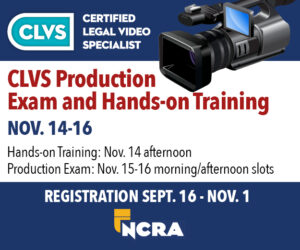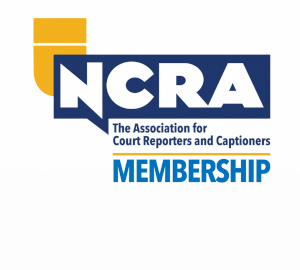
By Kim Cherry
You know what they say, everything is bigger in Texas! And that’s generally the case whether you’re talking about chicken fried steaks or road construction. One thing that probably isn’t as big in Texas as in other areas, but is just as serious, is the shortage of court reporters. We have heard about this issue for the past five years, and small actions have been taken to try to alleviate the impeding predictions. The 2013-2014 Industry Outlook Report by Ducker Worldwide (commissioned by NCRA) forecast has essentially come to fruition in all aspects.
In Texas, it was estimated that in 2018 we would be approximately 500 court reporters short of the demand. While some areas across our big state have felt the impact more than others, it has definitely become the main focus of those concerned in seeking answers.
In 2017, the Texas Court Reporters Association (TCRA) laid the groundwork for gaining momentum in this area. Instead of just sitting idly by, “hoping” and discussing the problem, TCRA polled its members, received input from stakeholders, hired some spit-fire lobbyists, and set out to put the train back on the track.
The Texas Legislature runs at a different time schedule than many other states, and January 2019 was the beginning of the 86th Legislative session in Texas. Preparations had been made and TCRA, led by Steve and Amy Bresnen, trudged forward to make legislative history for Texas court reporters.
Texas H.B. 1619 was first introduced by a well-respected legislator, House Representative Jeff Leach, and co-authored by House Representative Art Fierro. Leach was chair of the House Committee on Judiciary & Civil Jurisprudence, which was exactly where the bill needed to land. Texas Senate Bill 2094 was introduced in the other assembly by Sen. Brian Hughes. With those two bills being filed, we were planted to further our endeavors of righting the derailment.
Now the hard work began. Our two esteemed lobbyists worked tirelessly with the TCRA Legislative Committee, educating the legislature about the needs of the court reporting profession. Countless hours, phone calls, emails, and lots of prayer went into the daily regime of getting the bills through committees. It was an everyday diligent effort working on court reporters’ behalf, fueled by sheer determination and the continued subject of the “shortage.”
After several days, weeks, and months of work, an opportunity arose, and we jumped. Texas Senate Bill 891, an omnibus bill, became our new ticket. An omnibus bill is a proposed law that can cover a number of diverse or unrelated topics. Omnibus is derived from Latin and means “for everything.” An omnibus bill is a single document that is accepted in a single vote by a legislature but packages together several measures into one. This was a perfect vehicle for our bill. And in the end, this is what was passed.
I would love to explain all of the facets of the bill that pertain to court reporters; but for the sake of brevity, I have included the link to the analysis of the entire bill so that those with inquiring minds may go read every part of the new law. You can see it all here. The part pertaining to court reporters is Section 7.
The short rundown is as follows:
■ Court reporters’ records are not subject to the electronic transmission of documents under the Business & Commerce Code;
■ Notice of appeal must be served directly on the court reporter responsible for preparing the record;
■ Requirement of court reporting firms to supply the signed document, known as further certification, to each reporter upon request;
■ Establishes two new categories/licenses of court reporters: apprenticeship court reporter and provisional court reporter;
■ Establishes reciprocity and substantially equivalent provisions;
■ Court reporting firms that are primarily owned and operated by a licensed court reporter shall pay only one registration fee;
■ Continuing education requirements for court reporting firms;
■ Clarifying complaint categories;
■ Clarifying gift-giving;
■ Outlining failure to fulfill commitments;
■ Clarifying prohibited contracts — restricting an attorney’s choice.
All of the new law has a definite impact on the court reporting profession. The three areas specifically addressing the shortage are the two new licenses established by the Legislature and the category entitled Reciprocity Agreement.
The apprenticeship and provisional licenses have been created in name, but the parameters of each license rest on the shoulders of the Texas Judicial Branch Certification Commission (JBCC), which regulates court reporters and firms in the state. Part of the legislation mandated the JBCC to establish a stakeholder group comprised of various interested parties to make recommendations for the requirements of each license. At the present time, those meetings have taken place and the recommendations have been approved by the JBCC. Those have been sent out for public comment and await approval by the Texas Supreme Court.
Essentially, the provisional license will be for those with an equivalent license outside of Texas to come work in Texas for a stated period of time until such time as they pass the skills portion of the Texas state test. It is required that prior to application for such license, the written portion of the Texas state test be passed and that the applicant show proof of performing court reporting in another jurisdiction for three of the preceding five years.
The apprenticeship license is designed for the student working to achieve passage of the state test. This would also be for a stated period of time and would entail passing Part B, the written portion of the test, and passing one portion of Part A, the skills portion. The apprentice would be required to be under direct supervision of a Texas certified court reporter and be limited in reporting certain types of legal proceedings. Other provisions apply and will soon be posted on the JBCC website.
The reciprocity agreement portion of the new law would involve much the same as a provisional license. It would require that the applicant have a substantially equivalent license as confirmed by the JBCC and have the same requirements of passage of the Texas written test and performing court reporting for three of the preceding five years. The reciprocity agreement differs from the provisional as the reciprocity would be for court reporters who have licenses from states that have been confirmed as substantially equivalent to the Texas state test by the JBCC prior to application.
As of Feb. 7, 2020, the following states have been deemed as substantially equivalent: Alabama, California, Georgia, Hawaii, Idaho, Illinois, Iowa, Kansas, Louisiana, Michigan, Mississippi, Missouri, Nevada, New Hampshire, New Jersey, Oregon, Utah, and West Virginia. More about the JBCC endorsement procedures are available here.
In regard to reciprocity, the Texas Government Code Sec. 152.202 outlines the specific rule, but in essence it only comes into play when an agreement has been reached with another state to offer certification that’s reciprocal. For example, if a reciprocity agreement was in place with New Mexico, court reporters from Texas could practice in New Mexico and New Mexico court reporters would be able to practice in Texas, so long as all the parameters are in place.
The Commission was also required by January 2020 to begin reaching out to other states in regard to reciprocity agreements. There are no agreements in place at this time.
There is still work to be done in bringing the train completely back on the track, but as you can see, Texas has made monumental steps in creating avenues to address the shortage in our profession. So, when you hear someone say, “Everything is bigger in Texas,” believe them. Along with having a big state, we have big ideas and even bigger solutions. Come to Texas and work!
Kim Cherry, RMR, is a past president of the Texas Court Reporters Association. She can be reached at kimcherry@rocketmail.com.













